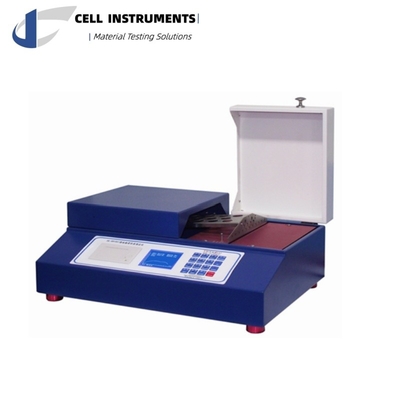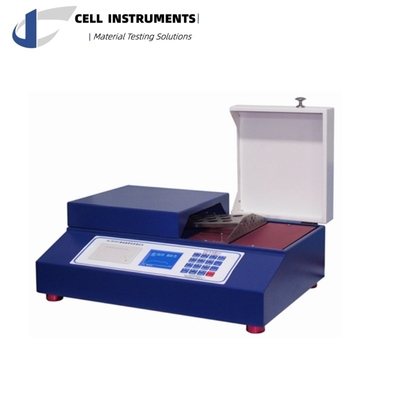Softness Tester Paper Softness Testing Instrument Best Hand-Feeling Softness Meter For Paper

Contact me for free samples and coupons.
WhatsApp:0086 18588475571
Wechat: 0086 18588475571
Skype: sales10@aixton.com
If you have any concern, we provide 24-hour online help.
x| Test Range | (10~1000) MN | Test Blade Size | R. Mm, 120mm*2mm L*D |
|---|---|---|---|
| Blade Stroke | 8±0.5mm | Test Speed | 1.2mm/s |
| Force Resolution | 1mN | Accuracy | ±1% |
| Slot Width | 5mm, 6.35mm, 10mm, 20mm | Power | AC 220V 50Hz |
Softness Tester Paper Softness Testing Instrument Best Hand-Feeling Softness Meter For Paper
![]()
Overview of the Paper Softness Testing Instrument
The RRD-01 Paper Softness Testing Instrument, also known as the Hand-Feeling Softness Meter, is a professional-grade device designed to measure the softness, flexibility, and hand-feel properties of various materials, including paper, tissue, non-woven fabrics, and tobacco sheets. This advanced instrument is widely used in industries such as packaging, food, pharmaceuticals, textiles, and laboratories to evaluate the physical qualities of end-products and semi-finished materials. Whether in R&D labs or quality control environments, the RRD-01 Paper Softness Testing Instrument delivers consistent, precise results, enabling users to maintain high standards across multiple industries.
| Test Range | (10~1000) mN |
| Test Blade Size | R. mm, 120mm*2mm L*D |
| Blade Stroke | 8±0.5mm |
| Test Speed | 1.2mm/s |
| Force Resolution | 1mN |
| Accuracy | ±1% |
| Slot Width | 5mm, 6.35mm, 10mm, 20mm |
| Power | AC 220V 50Hz |
Key Features of the Paper Softness Testing Instrument
-
High-Precision Softness Measurement
The Paper Softness Testing Instrument accurately assesses the softness of materials by measuring the force required to push a sample through a precisely controlled slot. This force is registered as an indication of the sample's bending resistance, directly correlating to its softness level. -
Automated and User-Friendly Operation
Equipped with an automated electronic measurement system, the instrument allows for streamlined testing without subjective human interference. Simply place the sample on the slot platform, initiate the test, and allow the instrument to generate consistent, repeatable results. -
Enhanced Testing Efficiency
The automated return function improves efficiency by resetting the test setup immediately after each measurement. This feature is particularly valuable for labs with high testing volumes, reducing time between samples and boosting productivity. -
Broad Application Across Industries
Designed for applications beyond paper testing, the RRD-01 Paper Softness Testing Instrument is compatible with tissues, non-wovens, polyolefin films, sanitary tissue products, and certain textiles. Its wide applicability supports quality assessment across diverse fields. -
Conformity with International Standards
The RRD-01 complies with recognized industry standards, including:- GB/T 8942: Paper-Determination of Softness
- ASTM D2923: Rigidity of Polyolefin Film and Sheeting
- QB/T 1060: Softness Tester
- TAPPI T498: Softness of Sanitary Tissues
- ASTM D6828: Stiffness of Fabric by Blade/Slot Procedure
- INDA IST 90.3, EDANA WSP 90.3: Standardized methods for non-woven softness testing.
Operating Principle of the Paper Softness Testing Instrument
The testing principle centers on a standardized bending resistance measurement. The sample material rests on a slot (separated by a fixed distance) between two plates. A blade (or probe) is then driven into the sample, penetrating it to an 8 mm depth. The maximum force exerted on the sample as it bends is recorded as its softness value. This blade/slot testing method allows precise differentiation of material softness by quantifying the force required for deformation.
Technical Specifications of the Paper Softness Testing Instrument
- Test Range: 10 to 1000 mN, suitable for a wide range of materials
- Blade Size: R mm, with dimensions of 120 mm (length) x 2 mm (depth)
- Blade Stroke: 8 ± 0.5 mm
- Testing Speed: 1.2 mm/s, optimized for accurate readings
- Force Resolution: 1 mN for sensitive force measurement
- Accuracy: ±1%, ensuring reliable results
- Slot Width Options: 5 mm, 6.35 mm, 10 mm, 20 mm, adaptable to various material types
- Power Supply: AC 220V, 50Hz, compatible with standard lab power settings
Advantages of Using the RRD-01 Paper Softness Testing Instrument
-
Enhanced Measurement Consistency
By minimizing human interference, the Paper Softness Testing Instrument ensures repeatable measurements and eliminates variances caused by subjective judgment, critical for applications requiring standardized softness testing. -
Simplified Setup and Operation
The design emphasizes user-friendliness, from sample placement to result generation. This intuitive setup allows operators at all experience levels to perform tests accurately, enhancing the instrument's versatility in professional and educational labs. -
Wide Testing Range for Diverse Applications
With a testing range spanning 10 to 1000 mN and multiple slot width options, the instrument accommodates various materials, from ultra-thin tissues to sturdier non-wovens and polyolefin sheets. This adaptability makes it a valuable asset in labs handling a mix of sample types. -
Fast and Reliable Data Output
Featuring a rapid test speed of 1.2 mm/s and a force resolution of 1 mN, the RRD-01 delivers quick and precise data, enhancing productivity in testing environments with demanding throughput requirements.
Applications of the Paper Softness Testing Instrument
The RRD-01 Paper Softness Testing Instrument is invaluable in sectors where material softness directly impacts product performance and consumer satisfaction. Applications include:
- Paper Industry: Evaluating tissue paper softness for consumer products
- Non-Woven Fabrics: Testing non-woven materials used in hygiene products, medical supplies, and industrial applications
- Packaging Materials: Assessing the rigidity and softness of polyolefin films and related packaging solutions
- Textiles: Determining the stiffness and flexibility of fabrics to enhance garment comfort and quality
- Pharmaceuticals: Testing the physical properties of packaging materials that require specific softness or rigidity characteristics




